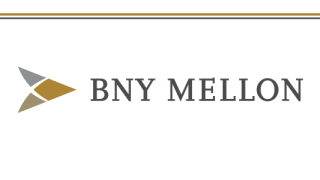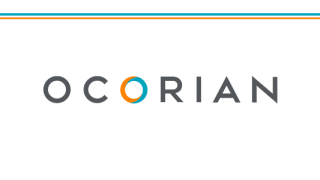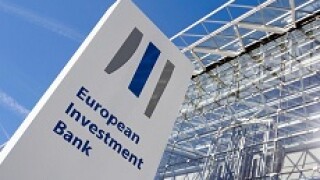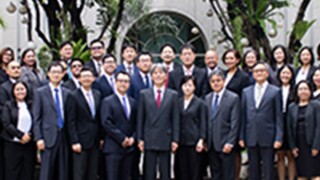-
Sponsored European Investment BankIt has been a year of tumult in the capital markets but you would not know that from examining the results of the European Investment Bank’s funding programme in 2020 and comparing it to 2019.
-
Sponsored VistraThe pandemic has been a time of immense difficulty for financial markets globally. The period of stress in the corporate sector has led to intense stress on economies large and small and the recovery following the 2020 coronavirus crisis will be long. But will also be a window of opportunity for market players. This is particularly true of the structured finance market, which may have a significant role to play in helping to clean up after a period of unprecedented distress. GlobalCapital and Vistra gathered a roundtable of market experts to discuss the state of securitization sectors in Europe, Asia and the US and the role of the product helping the market get back on its feet following months of pandemic stress.
-
Sponsored VistraWith countries beginning to emerge from the shadow of the pandemic, Navita Yadav, Vistra’s Global Head of Capital Markets, assesses the pandemic’s impact and examines what might lie ahead from a capital market perspective.
-
Sponsored European Investment BankWhen the European Parliament voted to approve the EU Taxonomy Regulation on June 18 — the final step in the Regulation’s legislative journey to providing the foundation for sustainable finance in Europe — more than just a glass was raised at the European Investment Bank. The issuer took the opportunity to issue a new Climate Awareness Bond (CAB) and announce the extension of CABs to two new project areas that substantially contribute to climate change mitigation.
-
Sponsored BNYThe period since March has been a turbulent time for financial markets, and the CLO sector in Europe dealt with a complex set of disruptions when the pandemic arrived this spring. From sudden and acute stress at the corporate level to an unprecedented shift in working conditions, CLO players in Europe experienced more uncertainty that hasn’t been seen since the last crisis. Yet, the market has adapted, and while the shape and size of deals may be different, CLOs in Europe are pushing ahead. BNY Mellon and GlobalCapital gathered a variety of market experts to discuss the present state and future prospects of the European CLO market.
-
Sponsored OcorianGlobalCapital speaks with Ocorian's James Maitland.
-
Sponsored OTP Global MarketsOTP Bank Treasury recently announced that it would restructure its business and change its name, continuing its international money and capital market operations as OTP Global Markets. GlobalCapital talked to managing director Attila Bánfi about the opportunities and challenges that the banking group’s international presence brings.
-
Sponsored China Southern Asset ManagementChina Southern Asset Management is in a strong position to capture opportunities in the Mainland’s rapidly growing equity fund market. The rising competition in this segment is only set to push it harder.
-
Sponsored DZ BankAs Europe starts to emerge from its coronavirus lockdown, economic restrictions are being eased and banks are returning to funding in the public markets. But the environment is markedly different from that which went before.
-
Sponsored European Investment BankFor well over a decade, the cornerstone of the European Investment Bank’s sustainability funding policy has been the conviction that the financial services industry has a pivotal role to play in spearheading the battle against climate change. As the EU’s climate bank, it has also consistently recognised its responsibility for developing best practice, which in turn helps promote enhanced environmental and social standards across the global financial community.
-
Sponsored European Investment BankWhen investors are presented with a new financial instrument, their instinct is generally to focus on pricing, relative value and liquidity. This is a natural response, especially in a low yield environment in which every basis point counts.
-
Sponsored BNYBy Tom Ahern. The European Securitization Regulation became applicable from January 1, 2019. It has a number of goals, including consolidating and recasting existing European regulations, establishing a framework for Simple, Transparent and Standardised securitization and introducing new transparency and disclosure requirements.
-
Sponsored European Investment BankOne year after the launch of the Clean Oceans Initiative, the European Investment Bank wants to use its success in tackling plastic pollution as a springboard to safeguard the wider blue economy.
-
Sponsored European Investment BankWith its push to embrace its role as the European Union’s climate bank, the European Investment Bank is set to play a key part in the alliance of multilateral development banks committed to fight climate change.
-
Sponsored European Investment BankThe European Investment Bank has set out a strategy for lending that will support the EU’s goal of decarbonising the economy by financing investments that cut emissions, combat climate change and support alternatives to fossil fuels.
-
Sponsored by CSCThe securitization market has come a long way since the financial crisis. In a low interest rate world, capital markets have been an attractive source of funds for companies, who can cut their cost of funds compared to issuing corporate debt while still offering yield hungry bond buyers relatively high returns.
-
-
Sponsored EuroclearHas change been driven entirely by regulatory compliance or have market forces also played a role?
-
Sponsored European Investment BankSince the issuance of a pioneering Climate Awareness Bond (CAB) by the European Investment Bank (EIB) in 2007, the global Green Bond market has expanded at an impressive pace, with total issuance passing the $500bn mark in the third quarter of 2018.
-
Sponsored CommerzbankTechnological innovation is dramatically disrupting society at every level, and financial services are no different. It is impossible to predict how technology will evolve, but the most successful banks will be the ones that adapt to become technology companies themselves, says Michael F. Spitz, CEO of Main Incubator, the research and development unit of Commerzbank.
-
Sponsored European Investment BankA compelling recent example of the EIB’s role as a “crowding-in” bank is its support for the Althelia Sustainable Ocean Fund (SOF), the first close of which was announced in September.
-
Sponsored European Investment BankIf that sounds like an easy question to answer, consider the hypothetical case of a lender backing a scheme to retrain adults as computer programmers, or accountants in a city like Katowice, the capital of the Polish region of Silesia
-
Sponsored European Investment BankThere are close to 5 million motorbikes and scooters in the Vietnamese capital city, Hanoi. To put this figure into perspective, it means there is more than one motorbike or scooter for every two residents of the city, which has a population of about 7.8 million
-
Sponsored CommerzbankStructured receivables finance is a distinct form of financing that enables companies to unlock capital tied up on their balance sheet relating to larger ticket receivables or contracts payable by their customers over time. Clients that use this structure view it as a key tool for management of liquidity and working capital, given such receivables are often less well suited to traditional forms of receivables financing, such as factoring or ABCP conduit funding
-
Sponsored EuroclearClearing Houses collecting margin to manage their counterparty risks is perhaps the central tenet of the G20 plan to de-risk the derivatives market. To work, it depends on collateral moving quickly and efficiently between market participants and clearing houses. Time is tight and delays can have major consequences.
-
Sponsored CGIFThe Asean+3 governments and regulators are maintaining their drive to create standardized bond and note issuance practices. The AMBIF initiatives began in 2014 and were followed by a pilot issue in the Thai baht bond market in 2015. Although there has been a hiatus since then the impetus towards uniformity is as strong as ever.
-
Sponsored CGIFStakeholders in Asean+3 multilateral financial institution Credit Guarantee and Investment Facility (CGIF) are set to boost its capital in a significant vote of confidence for CGIF. The additional capital will support expanded deal flows as CGIF builds on its impressive track record since its first credit guarantee facility in 2013. Founded in 2011, with 13 successful deals already completed and many notable milestones achieved, CGIF will in the foreseeable future become self-sustaining as the outstanding bond issues are repaid and guarantee capacity is recycled to new deals.
Sponsors
-
Sponsored by Barclays
-
Sponsored by BNY
-
Sponsored by China Southern Asset Management
-
Sponsored by CGIF
-
Sponsored by CIB
-
Sponsored by Citi
-
Sponsored by Commerzbank
-
Sponsored by CreditSights
-
Sponsored by CSC
-
Sponsored by DZ Bank
-
Sponsored by Euroclear
-
Sponsored by Euromoney Country Risk
-
Sponsored by European Investment Bank
-
Sponsored by EQ Credit Services
-
Sponsored by GlobalCollateral
-
Sponsored by HSBC
-
Sponsored by KfW
-
Sponsored by Moody's Investors Service
-
Sponsored by Ocorian
-
Sponsored by OTP Global Markets
-
Sponsored by RBC Capital Markets
-
Sponsored by Raiffeisen Bank International
-
Sponsored by Société Générale
-
Sponsored by TD Securities
-
Sponsored by UniCredit
-
Sponsored by Vistra
-
Sponsored by Wiener Börse






















